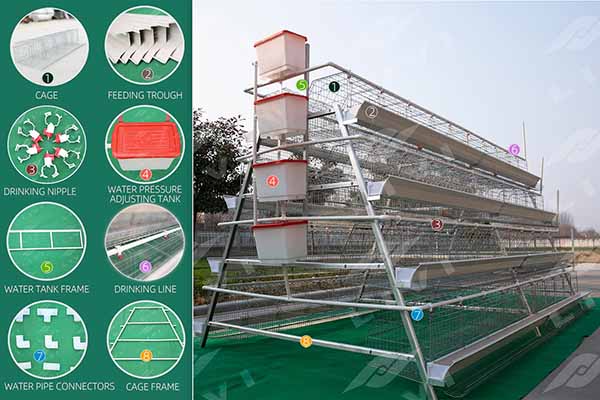Regular Inspection Items for Chicken Farming Equipment in Tanzania
Time : 2025-07-27
As a leading poultry equipment manufacturer from China, Livi Machinery is well-versed in the needs of the chicken farming industry worldwide, including Tanzania. Regular inspection of chicken farming equipment is crucial for maintaining optimal performance and preventing costly downtime. In this article, we will outline the key inspection items that are essential for chicken farming equipment in Tanzania.
1. Feeding Systems
1.1 Hopper and Feeding Line Inspections
The feeding system is the backbone of any chicken farm, ensuring that the birds receive the necessary nutrients. Regular inspections should include:
– Check for cracks or leaks in the hopper and feeding line. These issues can lead to wasted feed and potential health hazards for the chickens.
– Inspect the feeder mechanism for smooth operation. Any jamming or clogging can disrupt the feeding process.
– Ensure that the feeding rate is consistent. Inaccurate feeding can lead to malnutrition or overfeeding.
1.2 Feed Storage Inspections
Proper storage of feed is vital to prevent spoilage and maintain nutritional value. Key points to check include:
– Check the condition of the storage bins. Look for signs of rust, cracks, or damage that could compromise the integrity of the feed.
– Ensure proper ventilation to prevent mold growth. Poor ventilation can lead to feed spoilage and health issues for the chickens.
– Regularly inspect the quality of the stored feed. Look for signs of moisture, pests, or other contaminants.
2. Watering Systems
2.1 Water Line Inspections
Adequate water supply is crucial for the health and productivity of the chickens. Here’s what to look for:
– Inspect the water lines for leaks or clogs. Even a small leak can lead to water shortages.
– Ensure that the water pressure is consistent and sufficient. Low pressure can result in insufficient water supply.
– Check the waterers for any signs of wear or damage. Faulty waterers can lead to birds going without water.
2.2 Water Quality Inspections
Water quality is just as important as water availability. Regular checks should include:
– Test the water quality for pH levels, bacteria, and contaminants. Poor water quality can lead to health issues in the flock.
– Ensure that the waterers are cleaned and sanitized regularly. Build-up of bacteria can be harmful to the chickens.
– Inspect the waterers for algae growth, which can indicate a problem with water quality or sanitation.
3. Lighting Systems
3.1 Light Fixtures Inspections
Proper lighting is essential for the health and productivity of chickens. Key inspection points include:
– Check for any damaged or flickering lights. This can be a sign of a faulty electrical system.
– Ensure that the lighting is consistent throughout the facility. Inconsistent lighting can stress the birds and affect their growth.
– Inspect the bulbs for any signs of wear or burnout. Replacing bulbs regularly is important for maintaining proper lighting.
3.2 Light Timer Inspections
The timing of light exposure is crucial for the reproductive cycle of chickens. Regular inspections should include:
– Verify that the light timer is set correctly for the time of year. This is important for synchronizing the chickens’ internal clocks.
– Check the timer for any signs of malfunction. A faulty timer can lead to improper lighting cycles.
– Ensure that the timer is reliable and has a backup system in case of power outages.
4. Environmental Control Systems
4.1 Temperature and Humidity Sensors Inspections
Maintaining the right temperature and humidity levels is crucial for the well-being of chickens. Key inspection points include:
– Check the accuracy of the temperature and humidity sensors. Inaccurate readings can lead to overheating or overcooling.
– Inspect the fans and air exchangers for proper operation. Proper ventilation is essential for maintaining a healthy environment.
– Ensure that the cooling and heating systems are functioning correctly. Breakdowns in these systems can be catastrophic for the flock.
4.2 Ammonia Level Sensors Inspections
High ammonia levels can be harmful to chickens and lead to respiratory issues. Regular inspections should include:
– Check the ammonia level sensors for proper operation. Incorrect readings can lead to improper ventilation adjustments.
– Inspect the ventilation system for adequate air exchange. Poor air exchange can lead to ammonia buildup.
– Ensure that the ammonia removal system is functioning correctly. Regular maintenance is crucial for preventing ammonia-related health issues.
Conclusion
Regular inspections of chicken farming equipment in Tanzania are essential for maintaining a healthy and productive flock. By following these inspection guidelines, farmers can ensure that their equipment is in top condition and that their chickens are receiving the best care possible.
For more information on chicken farming equipment or to schedule a maintenance inspection, please contact Livi Machinery today.












